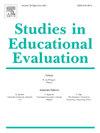以互动教学作为框架和工具,促进多学科教师教育和发展的对话和一致性
IF 2.6
2区 教育学
Q1 EDUCATION & EDUCATIONAL RESEARCH
引用次数: 0
摘要
本研究旨在探讨教学质量框架“互动教学”(TTI)如何作为监督职前教师学生的工具,并促进多学科背景下的一致性。使用基于tti的观察手册《课堂评估评分系统》(CLASS)对10名职前教师学生的课程进行了分析,得出了使用该框架的三种策略:(a)将个别教师学生的CLASS分数与已发表的研究数据进行比较;(b)识别和探索教师、学生或学校科目之间具有高度内部变异性的班级维度;(c)从特定学科的理论角度出发,探索选定CLASS维度的定量和定性方面。这些方法提供了共同的语言来促进学科之间以及理论与实践之间的一致性,将CLASS扩展为多学科背景下的工具。这弥补了通用观察系统的一些挑战,同时保持了跨学科边界有用的语言。本文章由计算机程序翻译,如有差异,请以英文原文为准。
Teaching through interactions as framework and tool to promote dialogue and coherence in multidisciplinary teacher education and development
The present work is an investigation into how the framework for teaching quality, Teaching through Interactions (TTI), can function as a tool for the supervision of pre-service teacher students and promote coherence in multidisciplinary contexts. Ten pre-service teacher students’ lessons were analysed using the TTI-based observation manual Classroom Assessment Scoring System, CLASS, giving rise to three strategies for utilising the framework: (a) comparing individual teacher students’ CLASS scores with data from published studies; (b) identifying and exploring CLASS dimensions with high internal variability among teacher students or school subjects; and (c) starting from a subject-specific theoretical perspective, exploring quantitative and qualitative aspects of a selected CLASS dimension. These approaches provide common language to promote coherence across subjects and between theory and practice, expanding CLASS as a tool in multidisciplinary contexts. This remedies some of the challenges with generic observation systems whilst maintaining a language that is useful across subject boundaries.
求助全文
通过发布文献求助,成功后即可免费获取论文全文。
去求助
来源期刊

Studies in Educational Evaluation
Multiple-
CiteScore
6.90
自引率
6.50%
发文量
90
审稿时长
62 days
期刊介绍:
Studies in Educational Evaluation publishes original reports of evaluation studies. Four types of articles are published by the journal: (a) Empirical evaluation studies representing evaluation practice in educational systems around the world; (b) Theoretical reflections and empirical studies related to issues involved in the evaluation of educational programs, educational institutions, educational personnel and student assessment; (c) Articles summarizing the state-of-the-art concerning specific topics in evaluation in general or in a particular country or group of countries; (d) Book reviews and brief abstracts of evaluation studies.
 求助内容:
求助内容: 应助结果提醒方式:
应助结果提醒方式:


